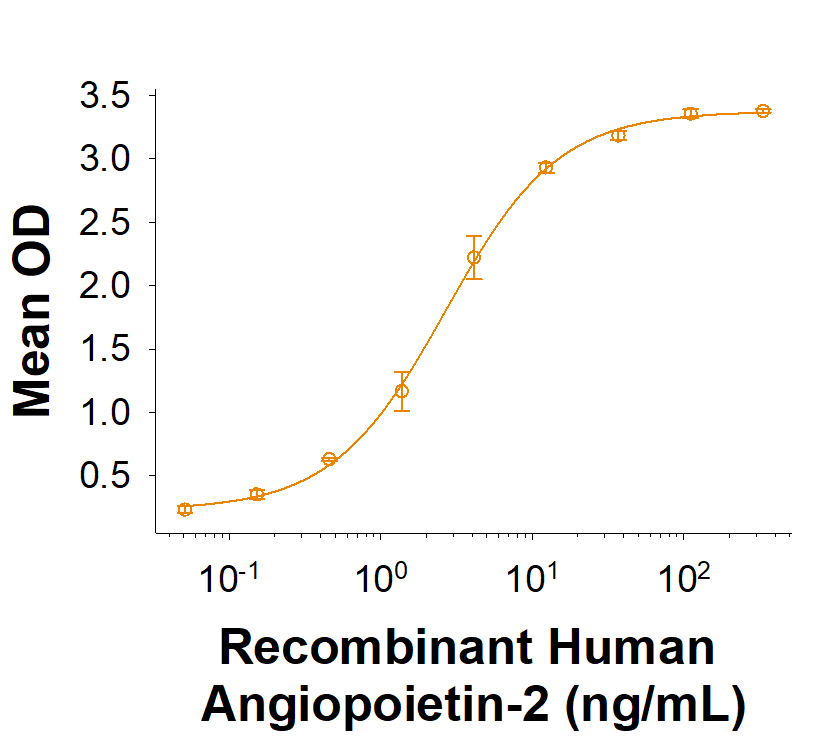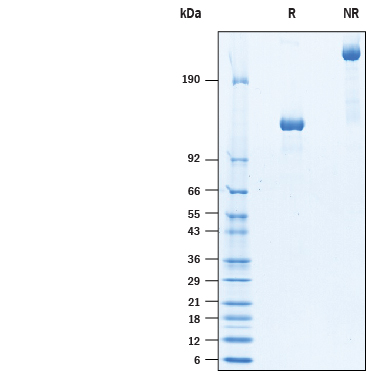Recombinant Cynomolgus Monkey Tie-2 Fc Chimera Protein, CF Summary
Product Specifications
| Cynomolgus Monkey Tie-2 (Ala23-Lys745) Accession # XP_005581645.1 | IEGRMD | Human IgG1 (Pro100-Lys330) |
| N-terminus | C-terminus | |
Analysis
Ala23
Product Datasheets
Carrier Free
CF stands for Carrier Free (CF). We typically add Bovine Serum Albumin (BSA) as a carrier protein to our recombinant proteins. Adding a carrier protein enhances protein stability, increases shelf-life, and allows the recombinant protein to be stored at a more dilute concentration. The carrier free version does not contain BSA.
In general, we advise purchasing the recombinant protein with BSA for use in cell or tissue culture, or as an ELISA standard. In contrast, the carrier free protein is recommended for applications, in which the presence of BSA could interfere.
10376-T2
| Formulation | Lyophilized from a 0.2 μm filtered solution in PBS with Trehalose. |
| Reconstitution | Reconstitute at 1 mg/mL in PBS. |
| Shipping | The product is shipped at ambient temperature. Upon receipt, store it immediately at the temperature recommended below. |
| Stability & Storage: | Use a manual defrost freezer and avoid repeated freeze-thaw cycles.
|
Scientific Data
 View Larger
View Larger
When Recombinant Cynomolgus Monkey Tie-2 Fc Chimera (Catalog # 10376-T2) is immobilized at 0.5 µg/mL (100 µL/well), Recombinant Human Aniopoietin-2 (Catalog # 623-AN) binds with an ED50 0f 1.5-15 ng/mL.
 View Larger
View Larger
2 μg/lane of Recombinant Cynomolgus Monkey Tie-2 Fc Chimera (Catalog # 10376-T2) was resolved with SDS-PAGE under reducing (R) and non-reducing (NR) conditions and visualized by Coomassie® Blue staining, showing bands at 118-132 kDa and 220 - 250 kDa, respectively.
Reconstitution Calculator
Background: Tie-2
Tie-1/Tie (tyrosine kinase with Ig and EGF homology domains 1) and Tie-2/Tek comprise a receptor tyrosine kinase (RTK) subfamily with unique structural characteristics: two immunoglobulin-like domains flanking three epidermal growth factor (EGF)-like domains and followed by three fibronectin type III-like repeats in the extracellular region and a split tyrosine kinase domain in the cytoplasmic region (1). These receptors are expressed primarily on endothelial and hematopoietic progenitor cells and play critical roles in angiogenesis, vasculogenesis and hematopoiesis (2). Cynomolgus Monkey Tie-2 cDNA encodes a 1124 amino acid (aa) residue precursor protein with a 22 residue putative signal peptide, a 723 residue extracellular domain and a 354 residue cytoplasmic domain. Two ligands, angiopoietin-1 (Ang-1) and angiopoietin-2 (Ang-2), which bind Tie-2 with high-affinity have been identified. Ang-2 has been reported to act as an antagonist for Ang-1. Mice engineered to overexpress Ang-2 or to lack Ang-1 or Tie-2 display similar angiogenesis defects (3).
- Partanen, J. and D.J. Dumont (1999) Curr. Top. Microbiol. Immunol. 237:159.
- Takakura, N. et al. (1998) Immunity 9:677.
- Procopio, W. et al. (1999) J. Biol. Chem. 274:30196.
FAQs
No product specific FAQs exist for this product, however you may
View all Proteins and Enzyme FAQsReviews for Recombinant Cynomolgus Monkey Tie-2 Fc Chimera Protein, CF
There are currently no reviews for this product. Be the first to review Recombinant Cynomolgus Monkey Tie-2 Fc Chimera Protein, CF and earn rewards!
Have you used Recombinant Cynomolgus Monkey Tie-2 Fc Chimera Protein, CF?
Submit a review and receive an Amazon gift card.
$25/€18/£15/$25CAN/¥75 Yuan/¥1250 Yen for a review with an image
$10/€7/£6/$10 CAD/¥70 Yuan/¥1110 Yen for a review without an image


